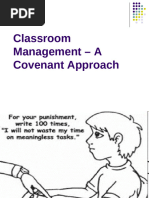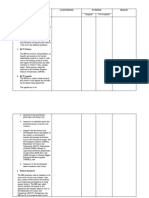0 ratings0% found this document useful (0 votes)
37 viewsClassroom Management Philosophy
Classroom Management Philosophy
Uploaded by
api-532840947Copyright:
© All Rights Reserved
Available Formats
Download as PDF, TXT or read online from Scribd
Classroom Management Philosophy
Classroom Management Philosophy
Uploaded by
api-5328409470 ratings0% found this document useful (0 votes)
37 views2 pagesOriginal Title
classroom management philosophy
Copyright
© © All Rights Reserved
Available Formats
PDF, TXT or read online from Scribd
Share this document
Did you find this document useful?
Is this content inappropriate?
Copyright:
© All Rights Reserved
Available Formats
Download as PDF, TXT or read online from Scribd
Download as pdf or txt
0 ratings0% found this document useful (0 votes)
37 views2 pagesClassroom Management Philosophy
Classroom Management Philosophy
Uploaded by
api-532840947Copyright:
© All Rights Reserved
Available Formats
Download as PDF, TXT or read online from Scribd
Download as pdf or txt
You are on page 1of 2
Philosophy of Classroom Management
I believe that classroom management is particularly important in a band setting because,
depending on the size of the program, the class sizes can be very large. As a result, it’s important
that rules, expectations, and procedures are clear from day one. Another reason why classroom
management is so important in a band classroom setting is because students are routinely
handling very expensive, and often delicate, equipment and instruments. To avoid damage to this
equipment, it’s important that students are taught how to properly treat school instruments with
care and respect.
One of the biggest influences on my classroom management philosophy is a book written
by author Miles Corwin titled: And Still We Rise. There’s also a great book titled These Kids are
out of Control by Heather B. Cunningham, Erika Gold Kestenberg, Lori Delale-O'Connor, and
H. Richard Milner. Both of these books showed me just how important it is to support the
students of diversity in my classroom. Many teachers and schools practice either a zero-tolerance
approach to classroom management or have an emphasis on non-compliance rules. It’s clear
from the two aforementioned readings that these approaches disproportionately affect students of
color. Knowing these facts will allow me to empathize and form positive connections with all of
my students in the classroom.
There’s another great book on classroom management, titled Teaching Hope and
Resilience to Students Experiencing Trauma by Douglas Fisher. This book, as well as Miles
Corwins’s previously mentioned book, opened my eyes to the power and positive influence that
student-teacher relationships can have on behavioral issues. My number one classroom
management strategy will always be relationship-building because I believe that it’s by far the
most effective method out there. Having a positive relationship with a student helps to establish
trust and a mutual respect between the student and the teacher. This ultimately leads to less
behavioral issues in the classroom. Great teachers are able to build positive connections with all
of their students and thus it will be my goal to do so.
References
Corwin, M. (2008). And Still We Rise The Trials and Triumphs of Twelve Gifted Inner-city
Students. Paw Prints.
Fisher, D., Frey, N., & Savitz, R. S. (2020). Teaching hope and resilience for students
experiencing trauma: Creating safe and nurturing classrooms for learning. New York:
Teachers College Press.
Milner, H. R., Cunningham, H. B., Delale-O'Connor, L., & Kestenberg, E. G. (2019). "These kids
are out of control": Why we must reimagine "classroom management" for equity. Thousand
Oaks, CA: Corwin, a SAGE Company
You might also like
- Beginning Band - First Day Lesson PlanDocument4 pagesBeginning Band - First Day Lesson Planapi-532840947No ratings yet
- Band Method Book and Solo Repertoire ListDocument8 pagesBand Method Book and Solo Repertoire Listapi-532840947No ratings yet
- Chemistry Teachers GuideDocument643 pagesChemistry Teachers Guidekarthikraja21100% (3)
- Position Statement - Classroom ManagementDocument5 pagesPosition Statement - Classroom Managementapi-373060871No ratings yet
- EDU4230 - Classroom Management Plan: (Charles, 1992.)Document4 pagesEDU4230 - Classroom Management Plan: (Charles, 1992.)Dave SnorlaxNo ratings yet
- Ued 495-496 Palmieri Scarlett Classroom and Behavior ManagementDocument6 pagesUed 495-496 Palmieri Scarlett Classroom and Behavior Managementapi-380957472100% (1)
- Ed 327 Paper 2Document6 pagesEd 327 Paper 2api-665170814No ratings yet
- CM PhilosophyDocument5 pagesCM Philosophyapi-532628985No ratings yet
- Myla A. Luay - Classroom Management - ReflectionDocument3 pagesMyla A. Luay - Classroom Management - Reflectionmay may abelleraNo ratings yet
- Draft 1 Philosophy of ManagementDocument6 pagesDraft 1 Philosophy of Managementapi-529193899No ratings yet
- Domain 2 The Classroom EnvironmentDocument5 pagesDomain 2 The Classroom Environmentapi-539351145No ratings yet
- Standard 6Document7 pagesStandard 6api-519224747No ratings yet
- Philosophy of Classroom Management 18918928 2h 2017Document24 pagesPhilosophy of Classroom Management 18918928 2h 2017api-356533687No ratings yet
- Goal6 ManagementDocument4 pagesGoal6 Managementapi-444488090No ratings yet
- Weekly Personal PhilosophyDocument19 pagesWeekly Personal Philosophyapi-357321063No ratings yet
- Highly Qualified For Successful Teaching Characteristics Every TeacherDocument9 pagesHighly Qualified For Successful Teaching Characteristics Every TeacherHazel Clemente CarreonNo ratings yet
- Gcu-Sec 510-Philosophy of Classroom Management-GiftDocument6 pagesGcu-Sec 510-Philosophy of Classroom Management-Giftapi-254305896No ratings yet
- Philosophy of Classroom ManagementDocument6 pagesPhilosophy of Classroom ManagementKate Klassen0% (1)
- School Management FblaDocument5 pagesSchool Management Fblaapi-319740475No ratings yet
- Philosophy of Classroom ManagementDocument7 pagesPhilosophy of Classroom ManagementKate KlassenNo ratings yet
- T4 Aksi Nyata PPDP - Devi KumalaDocument2 pagesT4 Aksi Nyata PPDP - Devi Kumalappg.devikumala01730No ratings yet
- Supportive School Enviroment - Classroom ClimateDocument8 pagesSupportive School Enviroment - Classroom ClimateYan ChenNo ratings yet
- My Teaching PhilosophyDocument3 pagesMy Teaching PhilosophyMariam AlkaabiNo ratings yet
- Ted690 Domain e Artifact 1 Irinyi Lorand 25 Ted626 Assignment 3a IrinyiDocument18 pagesTed690 Domain e Artifact 1 Irinyi Lorand 25 Ted626 Assignment 3a Irinyiapi-320743991No ratings yet
- Final Course ReflectionDocument5 pagesFinal Course Reflectionapi-657518334No ratings yet
- Educational Philosophy StatementDocument3 pagesEducational Philosophy Statementapi-331575268No ratings yet
- Master Paper - Future PlanningDocument3 pagesMaster Paper - Future Planningjemita.aucoinNo ratings yet
- Richard Curwin - Allen Mendler - Discipline With Dignity For Challenging Youth-Solution Tree Press (2004)Document168 pagesRichard Curwin - Allen Mendler - Discipline With Dignity For Challenging Youth-Solution Tree Press (2004)Edwin AldriantoNo ratings yet
- Ued 495 Classroom MGMT 1Document5 pagesUed 495 Classroom MGMT 1api-294922121No ratings yet
- Classroom Management Plan: 1. Praising Effort Rather Than Ability ADocument10 pagesClassroom Management Plan: 1. Praising Effort Rather Than Ability Aapi-336563431No ratings yet
- ManagementDocument4 pagesManagementapi-313621606No ratings yet
- Classroom Management Philosophy PaperDocument15 pagesClassroom Management Philosophy Paperapi-709290948No ratings yet
- Classroom Management - A Covenant Approach (for students)Document46 pagesClassroom Management - A Covenant Approach (for students)IqraNo ratings yet
- Annotaition 10Document1 pageAnnotaition 10api-294531266No ratings yet
- Management Statement 1Document4 pagesManagement Statement 1api-443882141No ratings yet
- CEP 841 Conflict Resolution Presentation ADocument27 pagesCEP 841 Conflict Resolution Presentation AgetashishvaidNo ratings yet
- Ued-496 Peltonen Kimberly Classroom and Behavior ManagementDocument9 pagesUed-496 Peltonen Kimberly Classroom and Behavior Managementapi-434364529No ratings yet
- Classroom Manangement PlanDocument6 pagesClassroom Manangement PlanAnonymous lNXj4qAUNo ratings yet
- Behavior and Classroom ManagementDocument5 pagesBehavior and Classroom Managementapi-434261972No ratings yet
- The Concept of Effective TeachingDocument10 pagesThe Concept of Effective TeachingSukay NahNo ratings yet
- Pple A2 p2Document18 pagesPple A2 p2api-464786469No ratings yet
- Running HeadDocument5 pagesRunning Headapi-314439359No ratings yet
- A TeacherDocument9 pagesA TeacherMota KholopoNo ratings yet
- Praising Effort Rather Than Ability ADocument10 pagesPraising Effort Rather Than Ability Aapi-336563431No ratings yet
- Finalunit 102082 Philosophy of Classroom Management Document R 1h208Document18 pagesFinalunit 102082 Philosophy of Classroom Management Document R 1h208api-357672587No ratings yet
- MakilangC_MaamEmen_ProfEd1Document1 pageMakilangC_MaamEmen_ProfEd1cmakilangNo ratings yet
- Developing Your Personal Philosophy of Classroom ManagementDocument17 pagesDeveloping Your Personal Philosophy of Classroom Managementapi-374402085No ratings yet
- Classroom Management PhilosophyDocument5 pagesClassroom Management Philosophyapi-438437760No ratings yet
- ReflectionDocument2 pagesReflectionapi-249051668No ratings yet
- rtl2 Assessment 1Document20 pagesrtl2 Assessment 1api-320209389No ratings yet
- Tschappat Portfolio-CmDocument4 pagesTschappat Portfolio-Cmapi-518796795No ratings yet
- The Organizational Behavior Movement (1950 - 1975) and Emerging Development in Organizational ThoughtDocument6 pagesThe Organizational Behavior Movement (1950 - 1975) and Emerging Development in Organizational Thoughtdinnes masubayNo ratings yet
- Research Inquiry Paper 2Document17 pagesResearch Inquiry Paper 2api-486152353No ratings yet
- Dolezsar Glarvin Thesis Chapters 1 To 5Document141 pagesDolezsar Glarvin Thesis Chapters 1 To 5Yeng Camila BarceNo ratings yet
- Kyle Sutton Classroom Environment PlanDocument13 pagesKyle Sutton Classroom Environment Planapi-650557780No ratings yet
- 10 Books That Every Educator ShouldDocument5 pages10 Books That Every Educator ShouldHitesh RaoNo ratings yet
- Educators ImpactDocument6 pagesEducators Impacttopnerd writerNo ratings yet
- Classroom Management PlanDocument5 pagesClassroom Management Planapi-331573623No ratings yet
- Te807 Stance On Quality Teaching RibickDocument8 pagesTe807 Stance On Quality Teaching Ribickapi-706718586No ratings yet
- Parker - Management PlanDocument7 pagesParker - Management PlanGabe ParkerNo ratings yet
- Sample Synthesis of Middle School CurriculumDocument16 pagesSample Synthesis of Middle School CurriculumRon Knorr. PhDNo ratings yet
- Trombone Educator Guide 1Document5 pagesTrombone Educator Guide 1api-532840947No ratings yet
- Performance Task Assessment 2Document17 pagesPerformance Task Assessment 2api-532840947No ratings yet
- Technology Infused Lesson PlanDocument8 pagesTechnology Infused Lesson Planapi-532840947No ratings yet
- Jazz Repertoire ListDocument10 pagesJazz Repertoire Listapi-532840947100% (1)
- Igcse Subject Codes and Options Priv Candidates 2022Document2 pagesIgcse Subject Codes and Options Priv Candidates 2022CalebNo ratings yet
- Sujet Corrige 1 LV1 Anglais Bac A1 Blanc 2023 BoundialiDocument6 pagesSujet Corrige 1 LV1 Anglais Bac A1 Blanc 2023 BoundialiDeva KadNo ratings yet
- Erasmus Student Application FormDocument5 pagesErasmus Student Application FormMartyna GrohsNo ratings yet
- DLL Peweek5Document4 pagesDLL Peweek5Ma. Ruffa GajoNo ratings yet
- Guide ApplicantsDocument62 pagesGuide ApplicantsDragos DragomirNo ratings yet
- Jagsom Application Form 2023Document3 pagesJagsom Application Form 2023Rajput RishavNo ratings yet
- English Language TeachingDocument12 pagesEnglish Language TeachingLiz CNo ratings yet
- Bumanglag Pme 3Document3 pagesBumanglag Pme 3Michael Sean BumanglagNo ratings yet
- Rethinking Learning: Carl Bereiter Marlene ScardamaliaDocument23 pagesRethinking Learning: Carl Bereiter Marlene ScardamaliaJ. Félix Angulo RascoNo ratings yet
- Evaluation of Senior Project - Final مهم نسيبDocument7 pagesEvaluation of Senior Project - Final مهم نسيبAhmed Mohammed100% (1)
- 447-Article Text-646-1-10-20210303Document11 pages447-Article Text-646-1-10-20210303rhochelannewenceslao18No ratings yet
- Book List 2022-23 Nur-XiiDocument14 pagesBook List 2022-23 Nur-XiiArea plotNo ratings yet
- C&C Alumni Newsletter Spring 2011Document6 pagesC&C Alumni Newsletter Spring 2011City and Country SchoolNo ratings yet
- Sharmeen's ResumeDocument2 pagesSharmeen's ResumeROYAL LION GAMERNo ratings yet
- Can Education Change Society_ by Michael AppleDocument4 pagesCan Education Change Society_ by Michael AppleFlorencia ZayasNo ratings yet
- Mini Project Guidelines For B.Tech Computer Science 2 Year and 3 & 4 Yr YearDocument5 pagesMini Project Guidelines For B.Tech Computer Science 2 Year and 3 & 4 Yr YearAmit KumarNo ratings yet
- Topic 1: Defining The Humanities: Learning ObjectivesDocument3 pagesTopic 1: Defining The Humanities: Learning ObjectivesChristineNo ratings yet
- Grade 4 ValuesDocument15 pagesGrade 4 Valuescollen corminalNo ratings yet
- Contrastive Analysis, Error Analysis, InterlanguageDocument22 pagesContrastive Analysis, Error Analysis, Interlanguagesong duaNo ratings yet
- Vstep Speaking-Part 2 Situations: Đường Phương Vstep Luyện Thi VstepDocument14 pagesVstep Speaking-Part 2 Situations: Đường Phương Vstep Luyện Thi VstepNguyễn Hương NhiNo ratings yet
- Ched Monitoring Checklist (Mba)Document26 pagesChed Monitoring Checklist (Mba)nioscocristine1900No ratings yet
- College of Trades and Technology: Camarines Norte State CollegeDocument2 pagesCollege of Trades and Technology: Camarines Norte State CollegeConNo ratings yet
- Performance Targets 1 1Document6 pagesPerformance Targets 1 1Ryan OlidianaNo ratings yet
- Get Interpersonal Relationships: Professional Communication Skills For Nurses 7th Edition Elizabeth Arnold Free All ChaptersDocument64 pagesGet Interpersonal Relationships: Professional Communication Skills For Nurses 7th Edition Elizabeth Arnold Free All Chapterszivdarpich100% (3)
- BE Form 03Document2 pagesBE Form 03Albert Hisoler100% (4)
- SBI PO Notification 2017Document4 pagesSBI PO Notification 2017eclonline.comNo ratings yet
- Maangarai Pirivu, Reddiyar Chattram, Dindigul - 624 622.: University College of Engineering, DindigulDocument1 pageMaangarai Pirivu, Reddiyar Chattram, Dindigul - 624 622.: University College of Engineering, DindigulVijay MNo ratings yet
- Lesson Plans 10aDocument171 pagesLesson Plans 10aapi-200557012No ratings yet
- E Book Student Study Guide DTPDocument46 pagesE Book Student Study Guide DTPBe UniqueNo ratings yet































































































